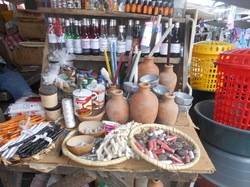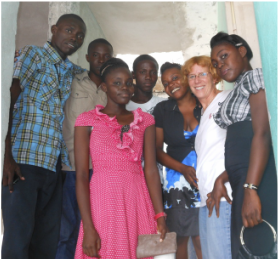Thrilled to be Back in Haiti

I return to Haiti, landing at the Port-au-Price Airport. Some things are just the same as when I left two years ago: A small group of musicians are playing in the corridor welcoming visitors on their way to baggage claim and a mob of porters and drivers are standing at the exit sign fighting for the chance to take people to wherever they are going. Jobs are still scarce and everyone is searching for a way to make ends meet.
But many things are different. The airport has been rebuilt, and now there are clean floors and long corridors that lead to immigration and customs. The roads have been cleared, and there are no longer dead cars blocking the way or piles of rubbish burning ’round every corner. Emaciated dogs aren’t roaming about and, although dusty, the city seems cleaner.
Zo, the driver who Lisette Narragon found on her trip to the country two years ago, is waiting for me at his van. My spirits lighten when our eyes meet. I am delighted to see him and to know that he is well. He takes my bag and asks me to step into his new “limousine.” It isn’t a Mercedes or a Lincoln Town Car, but a used van that seats eight and that has air conditioning–vastly more comfortable than his old jeep into which a crowded carload of volunteers used to squeeze. The biggest difference, however, is that I don’t worry about whether we will make it to our destination like I did each time I climbed into his car on past visits.
We drive directly to the Hospital Haiti-Medicare on rue A-Lazarre and get there at the expected time. HWB Executive Director Holly Manoogian greets me. She has the most welcoming way about her and I am thrilled to join the team. She leads me up the cement stairs and past rooms with peeling paint, rusty IV drip stands and beds with torn mattresses. Eventually we arrive at a large wooden door.
I pry open the door that has no knob and enter as Lauren Fox begins a new unit in the homeopathic education of a group of birth attendants. They sit around a wide table taking notes and asking detailed questions. She answers with a warm certainty that keeps their interest and that encourages discussion. I notice how they smile on learning new ways to treat blood loss and how they whisper amongst each other in Creole to review the specific cases which apply and to whom they’d give the remedies.
The next two days are dedicated to more classes and to the free clinic. I work with the Homéopathes Communautaires, young men and women who’ve been training with HWB for the last year. I sit between two, PG and Phadael, and listen as they take the cases of two brothers with coughs, an older woman with headaches and a young gentleman with scabies. As we work, the line of waiting patients fills the hospital corridor. Holly assigns numbers to keep order. And one by one their stories are heard and their remedies assigned until the hall empties.
But many things are different. The airport has been rebuilt, and now there are clean floors and long corridors that lead to immigration and customs. The roads have been cleared, and there are no longer dead cars blocking the way or piles of rubbish burning ’round every corner. Emaciated dogs aren’t roaming about and, although dusty, the city seems cleaner.
Zo, the driver who Lisette Narragon found on her trip to the country two years ago, is waiting for me at his van. My spirits lighten when our eyes meet. I am delighted to see him and to know that he is well. He takes my bag and asks me to step into his new “limousine.” It isn’t a Mercedes or a Lincoln Town Car, but a used van that seats eight and that has air conditioning–vastly more comfortable than his old jeep into which a crowded carload of volunteers used to squeeze. The biggest difference, however, is that I don’t worry about whether we will make it to our destination like I did each time I climbed into his car on past visits.
We drive directly to the Hospital Haiti-Medicare on rue A-Lazarre and get there at the expected time. HWB Executive Director Holly Manoogian greets me. She has the most welcoming way about her and I am thrilled to join the team. She leads me up the cement stairs and past rooms with peeling paint, rusty IV drip stands and beds with torn mattresses. Eventually we arrive at a large wooden door.
I pry open the door that has no knob and enter as Lauren Fox begins a new unit in the homeopathic education of a group of birth attendants. They sit around a wide table taking notes and asking detailed questions. She answers with a warm certainty that keeps their interest and that encourages discussion. I notice how they smile on learning new ways to treat blood loss and how they whisper amongst each other in Creole to review the specific cases which apply and to whom they’d give the remedies.
The next two days are dedicated to more classes and to the free clinic. I work with the Homéopathes Communautaires, young men and women who’ve been training with HWB for the last year. I sit between two, PG and Phadael, and listen as they take the cases of two brothers with coughs, an older woman with headaches and a young gentleman with scabies. As we work, the line of waiting patients fills the hospital corridor. Holly assigns numbers to keep order. And one by one their stories are heard and their remedies assigned until the hall empties.

At day’s end, I am surprised there were no injuries. Times have changed since the earthquake. No one comes with broken bones and there are no crushing injuries. But still almost every child has a skin eruption, almost every young woman has a vaginal infection and almost everyone complains of “the grippe.” Constitutional remedies like Sulphur, Medorrhinum and Sepia are critical here. Less important are Aconite, Hypericum and Arnica, the mainstay remedies of our first trips to Haiti.
When we return to the guesthouse at night, I am exhausted. Is it possible that it has become hotter here? The air is steamier and all of us sweat profusely. There is no hot water in the shower, but after a couple days, I couldn’t care less. I only wish that ice cubes came out from the showerhead. I use the little energy that I have left to answer my patient emails and then to sit at the dinner table to enjoy a meal of fried plantains, stewed vegetables and watercress that the cook, Cece, prepares.
When we return to the guesthouse at night, I am exhausted. Is it possible that it has become hotter here? The air is steamier and all of us sweat profusely. There is no hot water in the shower, but after a couple days, I couldn’t care less. I only wish that ice cubes came out from the showerhead. I use the little energy that I have left to answer my patient emails and then to sit at the dinner table to enjoy a meal of fried plantains, stewed vegetables and watercress that the cook, Cece, prepares.
Afterwards, we gather on the front porch and watch the clouds roll in from the sea. Lauren and I think it will rain. Holly is certain none will come. We sit there for hours as lightning fills the sky. The crash of thunder follows. Again and again the heavens light up with brightness and the air fills with rumbling song. Finally, on the last evening, a drenching rain comes that brings relief. I take advantage of the passing coolness and go to bed. While lying on top of my sheets, I think back on my Haitian journey.
The nation has come so far. The people are no longer in shock from the earthquake. They have moved on and are strong. There is rebuilding, roads are clearer and more people are engaged in rewarding work. And HWB has moved on too. The organization has created a successful training program for professionals (like the birth attendants) and for lay community leaders as well. Those with greatest interest have formed a cohesive group called the “Homéopathes Communautaires.” They are young and smart and determined to help their people. They have written papers and have become a national organization and soon, as their education continues and they master the art and science of homeopathy, they will become a professional organization ready to carry out the goals of HWB by offering safe effective natural medicines to those in need.
As I drift off to sleep I am grateful for having returned to Haiti with HWB. The warmth and elegance of the Haitian people is still here and I am sure will always be. But change is afoot and that change feels good. Homeopathy is in its infancy, but intelligent people, eager to improve healthcare in their beloved homeland, are nurturing it. I smile just before falling asleep, knowing that three years and several teams after a small group of volunteers arrived in a dilapidated airport hanger, their mission is being accomplished.
Now that’s something to celebrate.
Lauri Grossman. DC, CCH, HWB Volunteer
The nation has come so far. The people are no longer in shock from the earthquake. They have moved on and are strong. There is rebuilding, roads are clearer and more people are engaged in rewarding work. And HWB has moved on too. The organization has created a successful training program for professionals (like the birth attendants) and for lay community leaders as well. Those with greatest interest have formed a cohesive group called the “Homéopathes Communautaires.” They are young and smart and determined to help their people. They have written papers and have become a national organization and soon, as their education continues and they master the art and science of homeopathy, they will become a professional organization ready to carry out the goals of HWB by offering safe effective natural medicines to those in need.
As I drift off to sleep I am grateful for having returned to Haiti with HWB. The warmth and elegance of the Haitian people is still here and I am sure will always be. But change is afoot and that change feels good. Homeopathy is in its infancy, but intelligent people, eager to improve healthcare in their beloved homeland, are nurturing it. I smile just before falling asleep, knowing that three years and several teams after a small group of volunteers arrived in a dilapidated airport hanger, their mission is being accomplished.
Now that’s something to celebrate.
Lauri Grossman. DC, CCH, HWB Volunteer
